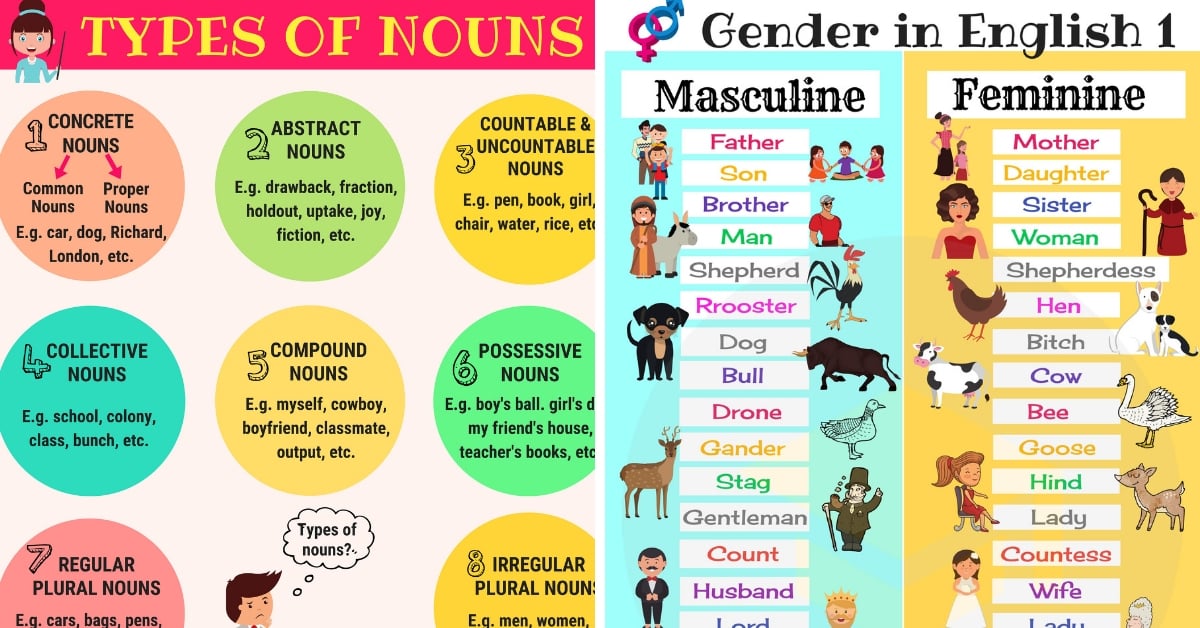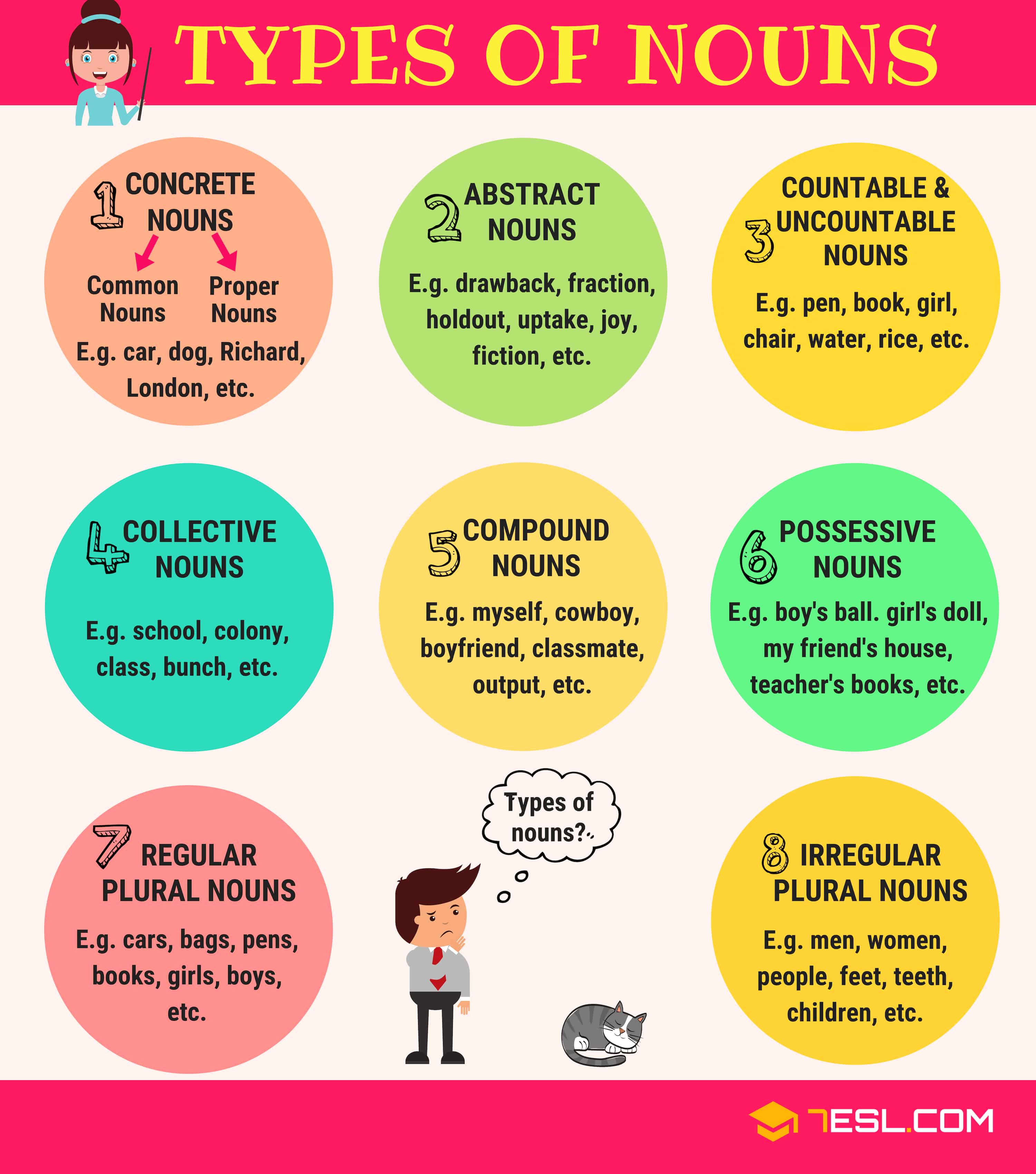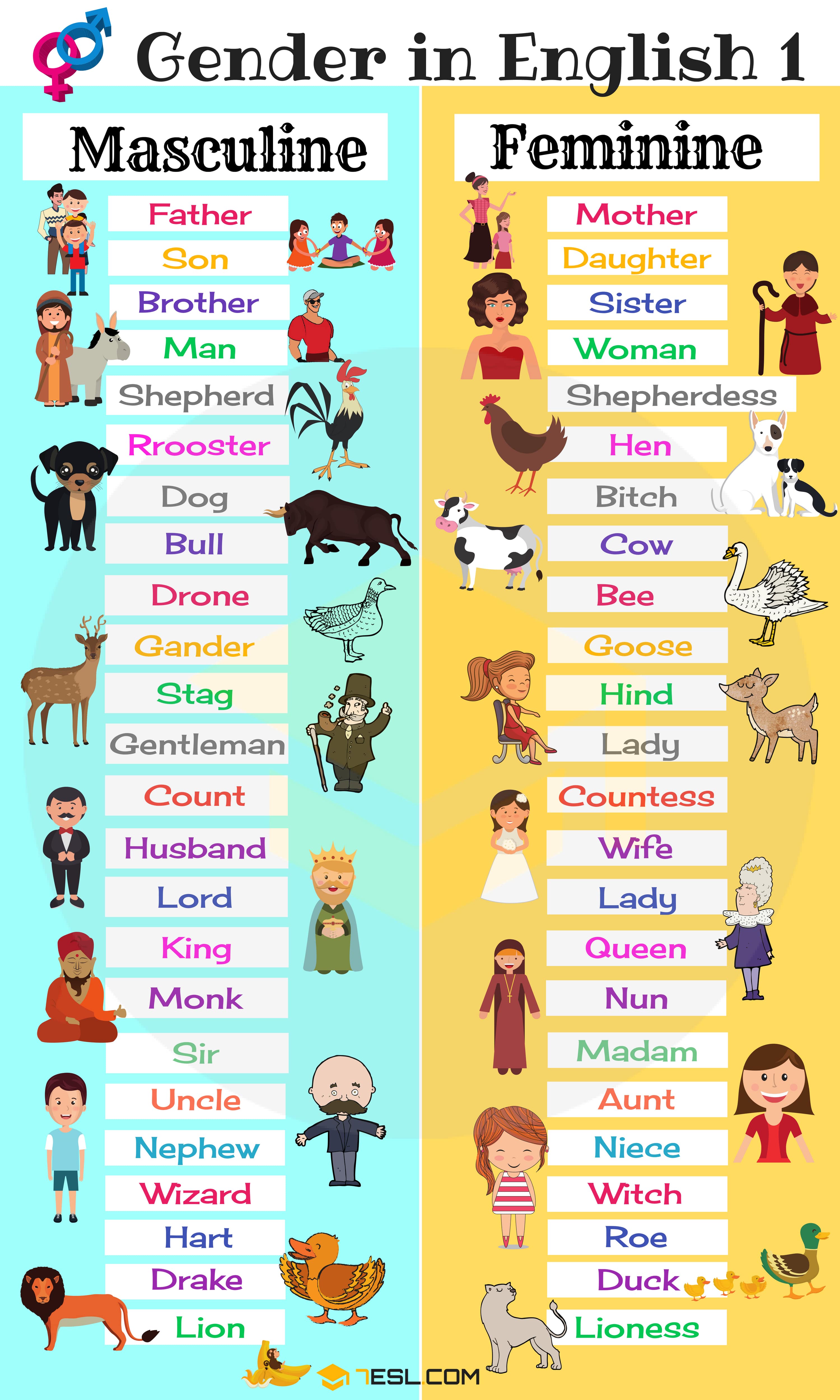Do you have questions about nouns and their uses? If so, the Ultimate Grammar Guide to Nouns in English has the answers you need. But what are nouns and how are they used? In this article, we are going to be taking a closer look at what a noun is, how it is used and the rules surrounding its use. Explore the list of different types of nouns and how to use them correctly with examples. Check out a list of common grammar mistakes to avoid making these errors in the future. Finally, the quiz below will test your noun knowledge.
Noun
What Is A Noun?
Noun Definition
In order to understand what a noun is, the most simple explanation is that a noun is a word which is used to refer to a person, item, thing or place. In every sentence in English, there must be a subject and that subject will always be a noun. However, the noun can also play other parts within a sentence such as the indirect or direct object, object or subject complement, adjective or appositive. This means that every sentence you create will feature a noun, making this one of the most important aspects of English grammar.
What is a noun? Noun is described as words that refer to a person, place, thing, event, substance, quality, quantity, etc. The noun is a part of speech typically denoting a person, place, thing, animal or idea.
There are many different types of nouns in English, each designed to serve a different purpose in an English sentence.
Noun Examples
As we mentioned earlier, the noun can be used to name a variety of different things. Let’s take a look a this.
Examples of Nouns to Name a Person
- The prime minister
- My sister
- A boy
- Barack Obama
Examples of Nouns to Name a Place
- The beach
- Mount Everest
- My kitchen
- Australia
Examples of Nouns to Name a Thing
- An idea
- The dog
- My plate
- The movie
Using a Noun in English Grammar
Using a Noun as a Subject or an Object
Each sentence that we speak or write must feature a subject and this will always be a noun. When we talk about the subject, we are referring to the place, person or thing which is completing the action (verb) within the sentence. Look at the following examples:
- John is tall.
- The ball bounced.
John and the ball are the subjects of these sentences and are both nouns.
However, the noun can also be used as the object of a sentence. This can be either as a direct object, which is the noun that is on the receiving end of the action that was performed by the subject, or as an indirect object which is a noun that is a recipient of the direct object. Let’s take a look at some examples of this.
- Hand the bags to him.
- Move the plate towards the baby.
In this case, the words him and baby are both nouns being used as the object of the sentence.
Nouns Used as Object and Subject Complements
A noun can be used as a subject complement and this usually occurs when using a linking verb such as seem, to be or become. An example of this is the sentence “John is a builder.” The noun builder is the subject complement as it is detailed what John is.
Further Uses of Nouns
There are many more ways in which a noun can function, let’s take a look at some of these now.
- When serving as an appositive noun, the noun will come directly after another noun as a way of defining it further. An example of this can be seen in this sentence, “My mother, Angela, is a nurse.” The noun Angela is the appositive noun as it gives us further information on the first noun, mother.
- A noun may also be used as an adjective in some cases as well. Consider the word ‘light.’ This is a noun when talking about the light or a light, however it can become an adjective, as seen in this sentence, “The house has a light kitchen.”
- When using a possessive noun, in other words, a noun which is used to denote possession of something, an apostrophe should be used. For example, “These are the baby’s things.”
Nouns
Concrete Nouns
Concrete nouns are people, places, or things that we observe using the five senses. Nouns that we hear, see, taste, touch, or smell belong to this category of nouns. We can subcategorize concrete nouns into 2 types of nouns: proper and common.
When looking at a sentence it is easy to pick out the concrete noun example. For example, She pets the zebra.
A zebra is something that you can touch, see, and hear. It is a common concrete noun.
Below find examples of nouns that are concrete.
Concrete Noun Examples
- apple
- bridge
- car
- couch
- composer
- dog
- elephant
- fish
- giraffe
- house
- igloo
- jaw
- knife
- lamb
- milk
- notebook
- ocean
- pen
- rainbow
- shoulder
- teen
- uncle
- villa
- wallet
- X-ray
- yacht
- zebra
Common nouns and proper nouns
Nouns are either common or proper. Common nouns do not refer to a particular person, place, or thing. Common nouns are not capitalized.
In contrast. proper nouns represent specific places, people, and things. You capitalize proper nouns no matter where they appear in a sentence.
An example of a proper noun would be Luke. The name refers to a specific person. In comparison, the common noun boy could refer to any number of males.
Examples of common nouns
- mother
- father
- sister
- brother
- boy
- girl
- grandma
- grandfather
- grandpa
- teenager
- tween
- dog
- cat
- bear
- jacket
- television
- boots
Examples of proper nouns
- Cambridge university
- John
- Mark
- New York
- the Louvre
- Canada
- New Zealand
- Marvel
- Superman
Abstract nouns
Abstract nouns are the opposite of concrete nouns. They are nouns that you cannot touch, taste, hear, see, or smell. Abstract nouns refer to concepts, ideas, qualities, and feelings that are not tangible.
Sometimes it can be difficult to pick an abstract noun out of a sentence. This happens when a word like love appears in a sentence. Sometimes the word operates as a verb instead of a noun. For example:
- I love my mother.
Love is an action in this sentence so it does not function as an abstract noun.
- Love is kind.
In this sentence love is a thing. Hence, it acts as an abstract noun that you cannot touch.
Some words can have more than one grammatical usage. It is important to pay attention to how a particular word functions in a sentence.
Abstract nouns make communication easier. To create abstract nouns the root word usually needs to change. Specific suffixes point to an abstract noun: -ism, -ment, -ity, -ship, -age, -tion, -ness, and -ability.
Also, abstract nouns can be possessive. They can be singular. They can be countable or uncountable.
Feeling examples
- love
- hate
- anger
Attribute examples
- beauty
- brilliance
- bravery
- honesty
Concept examples
- faith
- truth
- justice
- liberty
List of Nouns – Abstract Nouns Image
Countable and uncountable nouns
Items we count using numbers are countable nouns. These nouns are singular or plural. In the singular, countable nouns use a determiner like a or an. For example:
- I have a dog that smiles.
In the singular form, you can also use the number one.
- I have one dog that smiles.
The plural form uses a variety of different numbers along with the suffix -s or -es.
- She has three dogs.
If asking about a countable noun you would ask, “how much?”
Countable noun examples
- cow/cows
- duck/ducks
- idea/ideas
- shop/shops
In contrast, uncountable nouns usually operate with a singular verb. These nouns can be abstract or physically too small to count. Liquids or powders can be uncountable nouns. Uncountable nouns rarely have plural forms.
To ask about the quantity of an uncountable noun you would ask, “how much?” Uncountable nouns use expressions like some or a little bit. Additionally, these nouns use exact measurements: a cup of, a bag of, and a pinch of.
Uncountable noun examples
- tea
- water
- fear
- coffee
- anger
- happiness
- research
Below find examples of how to use an uncountable noun in a sentence.
- I did a little bit of research on the topic.
- I borrowed a bag of flour from my neighbor.
Note: Different languages have different nouns that are countable. In English, these words are uncountable: baggage, bread. furniture, traffic, and travel.
Collective Nouns
A group of people, animals, and things are collective nouns. Some collective nouns are versatile while others are not. For example, swarm typically describes bees and not lions. However, you could deliberately use the wrong collective noun to promote a specific image.
Generally, collective nouns are singular. They are only used in the plural form if they are emphasizing the individual members of a group. To make the plural flow better you can put a phrase like members of in front of the collective term. “The members of congress were sick” may be easier to read than “the congress were sick.”
Note: grammar checking software will most likely want to change were to was. Typically, the software views collective nouns as singular.
Examples
- flock
- group
- committee
- school
- choir
- team
- gang
- band
- herd
- gaggle
- litter
- swarm
Compound Nouns
Two or more words make up a compound noun. Some compound nouns can appear as a single word (closed), a hyphenated phrase, or two separate words (open). There are several different ways to create a compound noun. For example:
- noun + noun (football)
- adjective + noun (whiteboard)
- noun + adjective (handful)
- verb + noun (dining table)
- noun + verb (sunrise)
- verb + preposition (check-out)
- noun + prepositional phrase (brother-in-law)
- preposition + noun (overlord)
Possessive Nouns
Possessive nouns show ownership. A person, place, or thing can have something that belongs to them. Possessive nouns usually form by adding an ‘s to the end of a noun.
Examples
- The dog‘s toy showed damage.
- The boy‘s sandwich fell on the ground.
If the noun is plural and ends in s you simply add an apostrophe. If the plural form does not end in s then you add ‘s.
Examples
- The girls’ shoes went missing.
- The dogs’ toys went missing.
- The women’s shoes went missing.
Forming Possessive Nouns
Regular Plural Nouns
A regular plural noun uses the suffixes -s and -es to show more than one person, place, or thing.
Examples
- cat < cats
- dog < dogs
- fox < foxes
- girl < girls
Irregular Plural Nouns
Irregular plural nouns are plural nouns that are not formed by using the suffixes -s or -es. Instead, irregular plural nouns undergo separate changes.
Nouns ending in -f or -fe
To create the plural form of the word ending in -fe you need to replace the f with v then add -es.
- wife < wives
- life < lives
- leaf < leaves
The words roofs and proofs are exceptions to this pattern.
Nouns ending in -o
To create the plural form of the word ending in -o you need to add -es.
- potato < potatoes
- hero < heroes
Exceptions to this pattern exist. Some words ending in -o only need an s to make it plural. Examples include pianos and photos.
Nouns changing vowels
Sometimes vowels change in a word when moving from the singular to the plural tense. To illustrate, oo can change to ee or an can change to en.
- tooth < teeth
- woman < women
Large spelling changes
Some nouns take on huge spelling changes when forming the plural.
- mouse < mice
- ox < oxen
No change plural
We write some nouns the same way whether plural or singular. This includes words like deer, sheep, and fish.
-ex
A noun that ends in -ex usually takes the ending -ice or -xes when forming the plural.
- vortex < vortexes
- index < indices
Gender of Nouns
Common Mistakes with Nouns
- Changing a word that has the same singular and plural form. (You would not add an -s to words like information or furniture to make it plural.)
- Using a singular noun when you need a plural noun.
- Forgetting to use a determiner when the noun is in the singular case.
- Interchanging an uncountable noun for a countable one.
- Inconsistent plural/ singular noun usage.
- Mistaking an irregular noun for a regular one.
Noun Quiz
Circle the correct answer for every question. Which word correctly represents the noun.
- The girls went to the store. (singular or plural)
- I visited my three sisters. (countable or uncountable)
- The underworld grows dark. (uncountable or compound)
- The girls’ dog liked mice. (possessive or regular plural)
- I added a cup of sugar to the mix. (countable or uncountable)
- The muffin was on the counter. (abstract or concrete)
- Fear divides people. (abstract or possessive)
- I do not have dog. (missing determiner or collective)
- A flock of seagulls lived by the bay. (abstract or collective)
- How much tea do you have? (countable or uncountable)
Conclusion
The noun is an integral part of the English language, in fact, you cannot make a sentence without one. By understanding their use and the rules surrounding them, you will be able to form grammatically correct sentences.














0 Comments